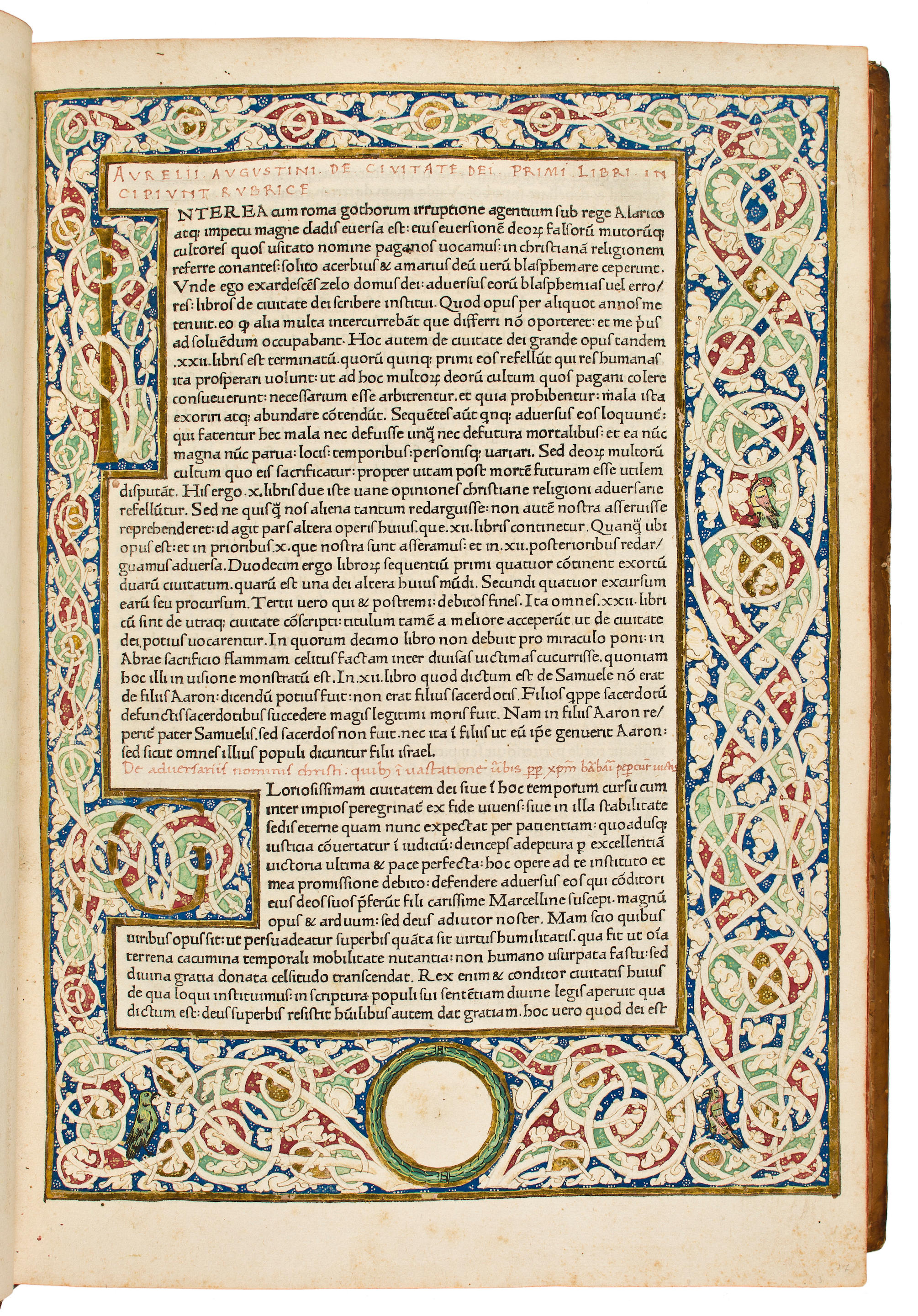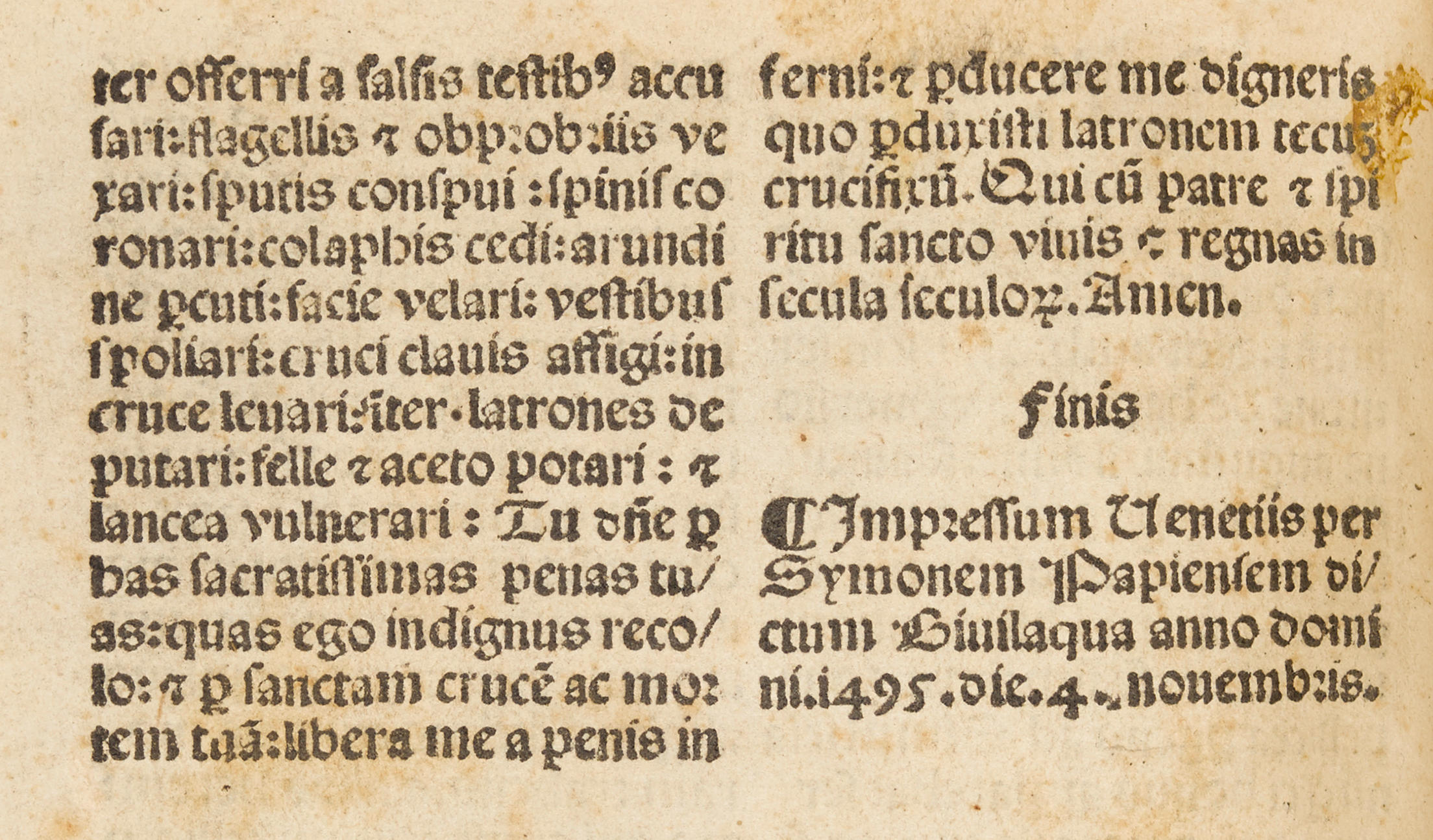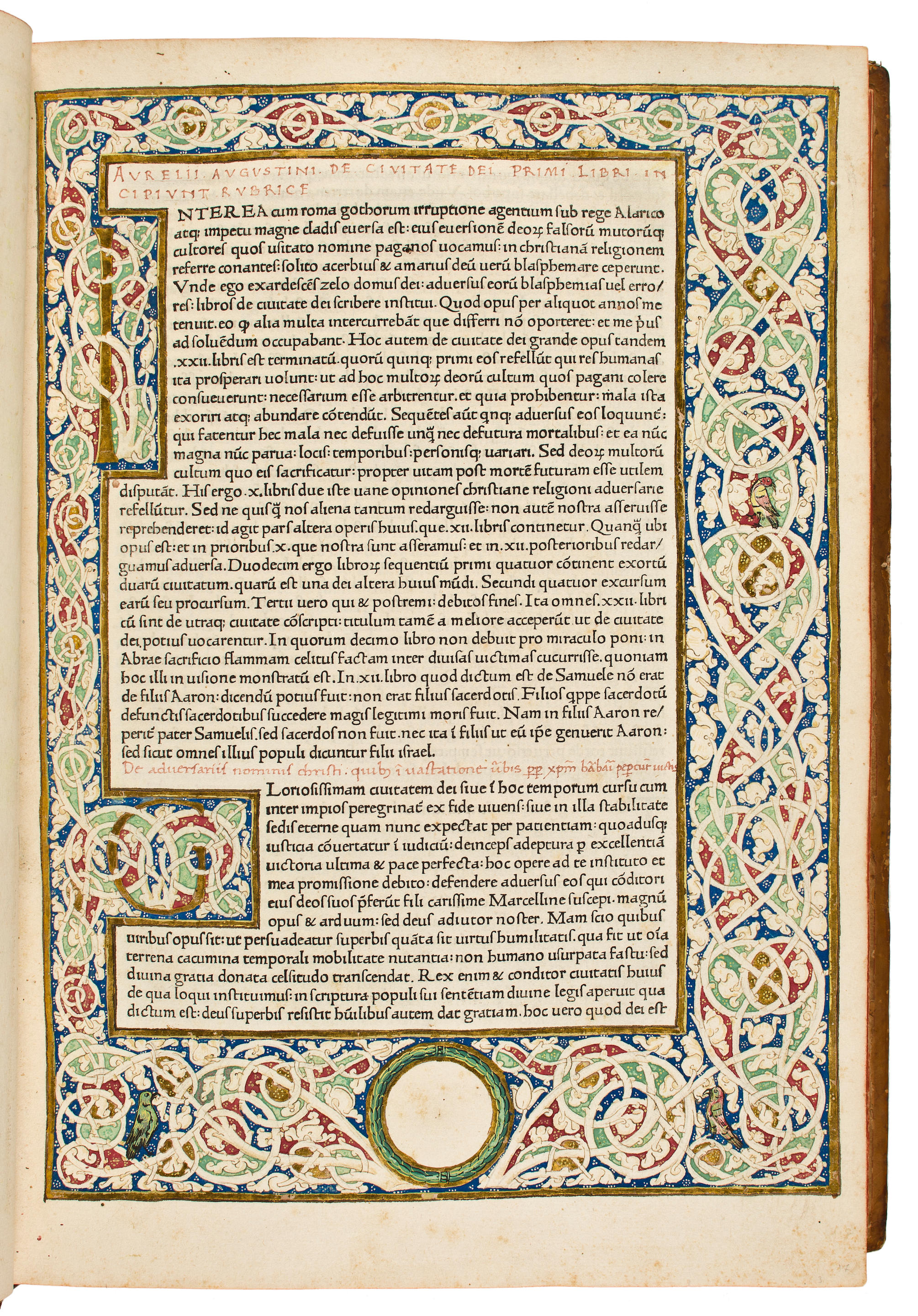AUGUSTINUS, Aurelius (Saint, 354-430) De civitate dei. Venice: Johannes and Vindelinus de Spira, 1470. Third edition of Augustine’s magnum opus, only the fourth book ever printed at Venice, and the first Venetian edition. The primacy of Augustine is reflected in the priority accorded his works in the earliest Italian printing programmes at Subiaco, Rome and Venice. De civitate Dei was especially prized by humanist scholars as a rich conduit of Platonic and other classical thought. In addition to exercising a monumental influence on western thought and theology, St Augustine paved the way for the European scientific revolution. His view of human history as a developmental process with meaning presumed an assessment of ‘things in terms of their origins and of the steps that have led to their present state. … Few men have influenced human thought as Augustine did Western religion and philosophy’ (DSB).’ Johannes de Spira established the first press at Venice in 1469. Johannes died suddenly, and the edition was completed by his brother Vindelinus, named here for the first time. The colophon also gives valuable evidence for the earlier books, stating that the Pliny, which immediately preceded De civitate Dei, was printed in 100 copies within 3 months. Based on the number of other works subsequently printed by Vindelinus in 1470, Geldner argues that the Augustinus appeared early in 1470 and thus pre-dates Sweynheym and Pannartz's edition printed at Rome the same year (Die deutschen Inkunabeldrucker, pp.62-4). H *2048; GW 2877; BMC V 153; Bod-inc A-520; BSB-Ink A-855; CIBN A-679; Goff A-1233; ISTC ia01233000. Royal folio (396 x 278mm). 272 (of 274, without blanks 2⁄8 and 28⁄10 but with initial blank) leaves. Contemporary south German decoration: major initials in interlocking red and blue with pink and green penwork decoration, minor initials alternating in red or blue over ms. guide-letter, book and chapter numbering in red, vellum quire guards, very occasional early quiring preserved (light worming, sometimes effecting a few letters). Contemporary Germanic leather over thick wooden boards, chased metal cornerpieces (somewhat worn, restored, clasps renewed); modern black morocco-backed case. Provenance: contemporary annotations in a contemporary Italian humanist hand, and at least one other, in black or red ink – Schwäbisch-Gmünd, Franciscan convent (inscription) – George Kloss, M.D., of Frankfurt (not in his 1835 sale catalogue; bookplate).
AUGUSTINUS, Aurelius (Saint, 354-430) De civitate dei. Venice: Johannes and Vindelinus de Spira, 1470. Third edition of Augustine’s magnum opus, only the fourth book ever printed at Venice, and the first Venetian edition. The primacy of Augustine is reflected in the priority accorded his works in the earliest Italian printing programmes at Subiaco, Rome and Venice. De civitate Dei was especially prized by humanist scholars as a rich conduit of Platonic and other classical thought. In addition to exercising a monumental influence on western thought and theology, St Augustine paved the way for the European scientific revolution. His view of human history as a developmental process with meaning presumed an assessment of ‘things in terms of their origins and of the steps that have led to their present state. … Few men have influenced human thought as Augustine did Western religion and philosophy’ (DSB).’ Johannes de Spira established the first press at Venice in 1469. Johannes died suddenly, and the edition was completed by his brother Vindelinus, named here for the first time. The colophon also gives valuable evidence for the earlier books, stating that the Pliny, which immediately preceded De civitate Dei, was printed in 100 copies within 3 months. Based on the number of other works subsequently printed by Vindelinus in 1470, Geldner argues that the Augustinus appeared early in 1470 and thus pre-dates Sweynheym and Pannartz's edition printed at Rome the same year (Die deutschen Inkunabeldrucker, pp.62-4). H *2048; GW 2877; BMC V 153; Bod-inc A-520; BSB-Ink A-855; CIBN A-679; Goff A-1233; ISTC ia01233000. Royal folio (396 x 278mm). 272 (of 274, without blanks 2⁄8 and 28⁄10 but with initial blank) leaves. Contemporary south German decoration: major initials in interlocking red and blue with pink and green penwork decoration, minor initials alternating in red or blue over ms. guide-letter, book and chapter numbering in red, vellum quire guards, very occasional early quiring preserved (light worming, sometimes effecting a few letters). Contemporary Germanic leather over thick wooden boards, chased metal cornerpieces (somewhat worn, restored, clasps renewed); modern black morocco-backed case. Provenance: contemporary annotations in a contemporary Italian humanist hand, and at least one other, in black or red ink – Schwäbisch-Gmünd, Franciscan convent (inscription) – George Kloss, M.D., of Frankfurt (not in his 1835 sale catalogue; bookplate).


.jpg)












Testen Sie LotSearch und seine Premium-Features 7 Tage - ohne Kosten!
Lassen Sie sich automatisch über neue Objekte in kommenden Auktionen benachrichtigen.
Suchauftrag anlegen